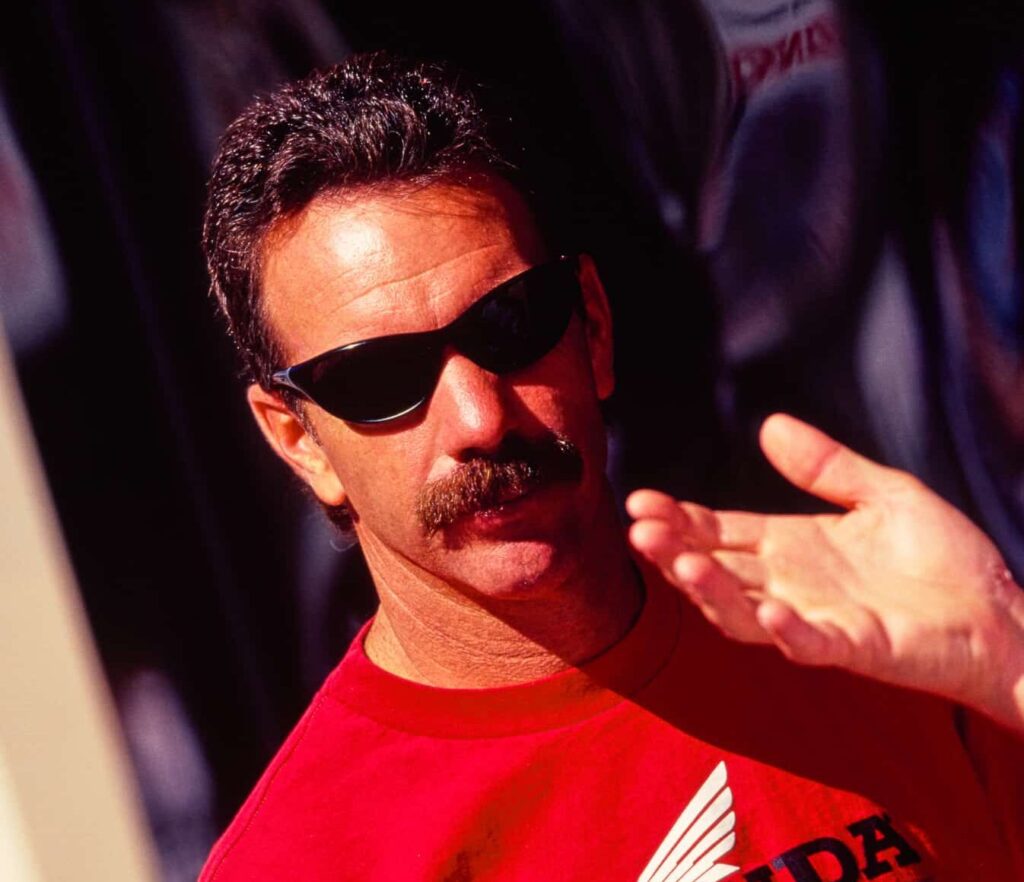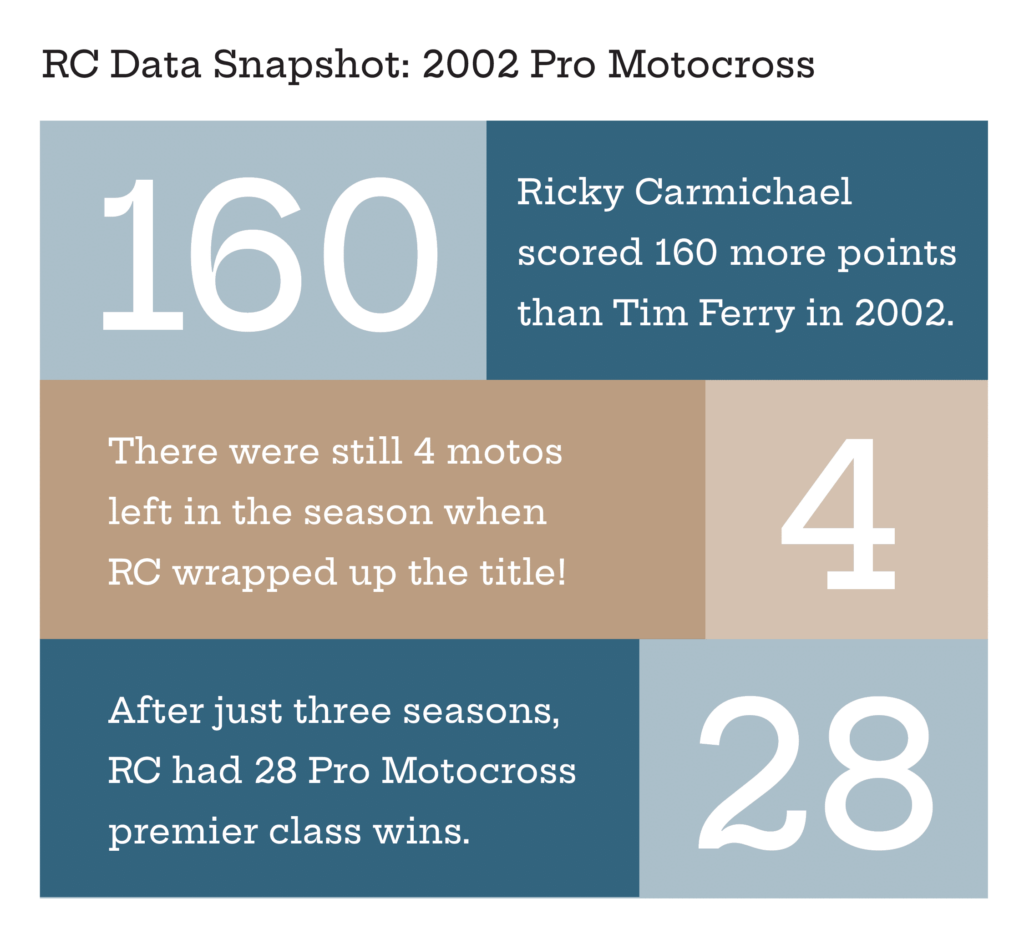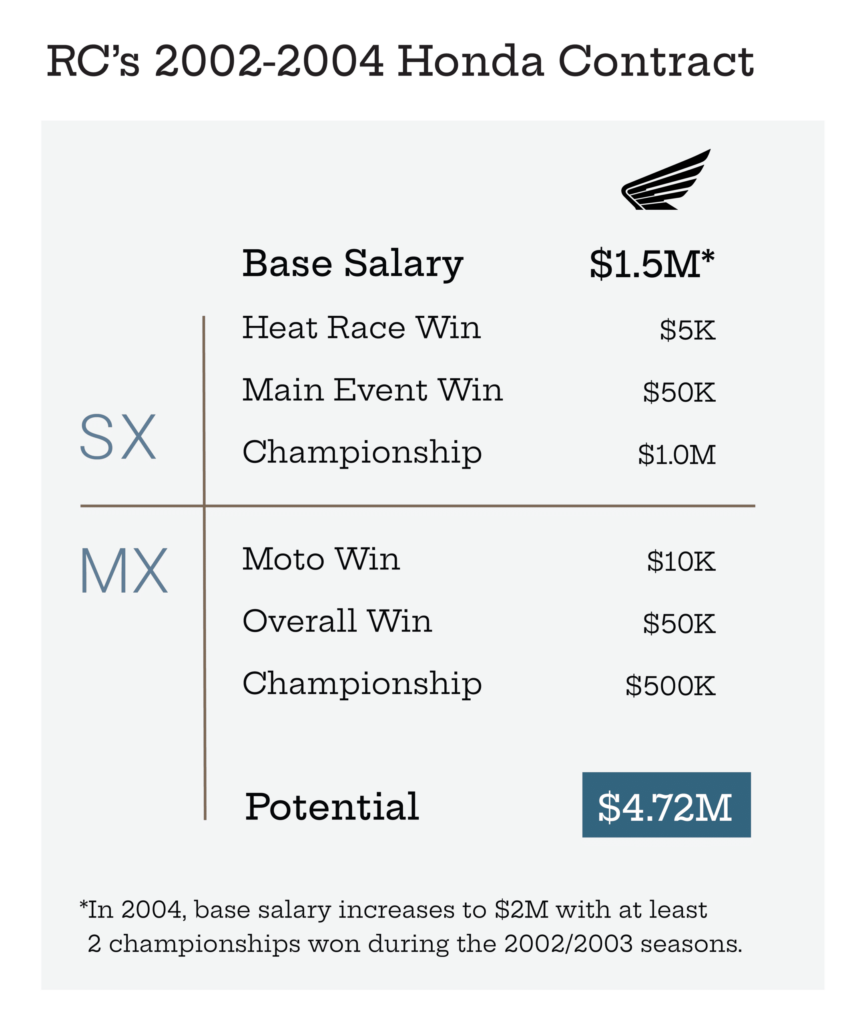
Part 2: Honda snatches Ricky Carmichael away from Kawasaki
Almost four years before Chuck Miller’s job was to keep Ricky Carmichael on a Honda, he devised a plan to get Carmichael to switch to Honda. The light bulb moment came while sitting on a hillside at Spring Creek Motocross Park in Millville, Minnesota. It was August 13, 2000, the 10th round of the AMA Pro Motocross Championships.

As the manager of motorcycle sports for American Honda, part of his job was personnel placement: find the right people to help Honda win. But Honda had not been winning. At least not enough to please the leaders of a company that had won often since 1973, their first year in American motocross competition.
Miller reported to Ray Blank and he could hear Blank’s voice in his head: ‘Miller? What are you doing? We’re supposed to be winning. What’s wrong out there?’ Sitting in the grass watching Carmichael dominate at Millville, Miller mused, ‘you’re not going to beat that guy. The only way for us to win is to just go get that guy.’

By that point in the summer, the AMA Pro Motocross championship was nearly a foregone conclusion. Carmichael already had seven overall wins and left Millville with a 40-point lead over Honda’s Sebastien Tortelli. On top of that, Tortelli’s teammate Ezra Lusk dropped out of the season after that race, his second withdrawal that summer.
FAST TRIVIA
What was Carmichael's pro win % at Kawasaki (all AMA races/classes)
Once again, the chances of a Red Rider holding up the number one plate looked bleak. In the Supercross season ended three months earlier, Honda won a single main event (Windham). At Red Bud, Tortelli grabbed their only premier class motocross win of the summer. This was unfamiliar territory to all Honda employees. It had been four years since they won a Supercross championship and five since Jeremy McGrath’s 1995 AMA Pro Motocross title.
Miller went back to Torrance, Calif., presented a plan to get Carmichael and recalls Blank telling him to go ahead and figure out how to make it happen. Nine months later, at the Cheesecake Factory in Irvine, Calif. Carmichael signed his name to a 30-page-long document to ride red for the first time since 1985, the year he found a Honda Z50 under the Christmas tree.

The 2001 AMA Pro Motocross Championship hadn’t even started.
The financial terms were eye-popping, especially in a sport that still had no live television package. The Honda contract paid $1,500,000 in base salary in year one (2002) with championship bonuses of $1,000,000 for supercross and $500,000 for motocross. The race performance bonuses were equally as lucrative at $50,000 per win/overall, $5,000 for heat race wins and $10,000 for individual moto victories.

Carmichael had ridden exclusively for Kawasaki since 1988, when he was nine years old and they weren’t going to let him walk without a fight. Miller said Honda secured Carmichael’s services on a technological technicality.
Kawasaki had first right of refusal and matched Honda’s financial offer but they couldn’t match the equipment; Carmichael wanted the option to ride a four stroke and Honda already had a 450 deep in development. The prototype hit the track in the summer of 2001. Kawasaki didn’t put a 450 on the professional series in America until 2006.

Carmichael’s Honda tenure started roughly. In October, the crowd booed him with vehemence during the opening ceremonies of the 2001 US Open in Las Vegas. That December he went over the bars practicing at home. He suffered a concussion, a tweaked back and a hole in his leg that required staples.

The vivid details captured in an 11-photo sequence by Simon Cudby were kept secret for nearly a year. Then, at round one of the 2002 AMA Supercross season, he crashed out on lap five in what looked like a season ending slam. He finished 20th. Miller got called into Blank’s office.
“What happened? I thought this was going to be different,” Blank asked him.
Miller said the team worked diligently to set the bike up better for Carmichael. He returned at round two and finished 4th and then 4th again at round three.
From there, he dominated. For the first time since 1995 Honda won the premier class championships in both Supercross and motocross. In motocross, Carmichael did the unthinkable: he won all 24 motos.
Going to the line, I went, ‘Holy s—, man. I have to win.’
Ricky Carmichael
He swears he felt no pressure during the 2002 Pro Motocross season until he lined up for the 24th and final moto. “That’s when it hit me. And it hit me like a ton of bricks,” he says, 20 years later. “Going to the line, I went, ‘Holy s—, man. I have to win.’ I had never experienced pressure like that in my life, even with all the championships that I had won.”


Honda was back on top, in a big way, bigger than even they expected. Carmichael won 11 Supercross main events and 12 motocross overalls in his first year, triggering $2,950,000 in performance bonuses alone (heat races, main events, motos, overalls and championships). His moto win and overall bonus payouts for Pro Motocross in 2002 were $340,000 more than the championship bonus. Honda went from winning just two races in 2000 and one in 2001, to all but three in 2002 (Honda-mounted Mike LaRocco and Nathan Ramsey each won a Supercross main).
And both championships.
They even won the 2002 125 West Supercross title with Travis Preston. The two appeared on a Cycle News cover with their number one plates and the cover line: “Red Reign, Preston & Carmichael End the Drought”.

That 82% win rate by Carmichael caused a stir in the executive offices of American Honda. When manufacturers hire athletes, they estimate how many races a specific rider is expected to win and make a budget based on that forecast. They planned for Carmichael to win more than 50% of the races but he blew that forecast and then some. His performance bonuses were double his base salary. The $4.45 million Carmichael earned was 94.3% of the contract’s potential limit.

“We were WAY over budget at the time,” Chuck Miller says. “It was crazy. I’ll never forget at the end of the year I got in trouble.” Miller went from getting heat for not winning enough, to getting heat for winning too much. He got called into an office to meet Honda executives he didn’t normally interact with. Blank was also present but didn’t speak.
I remember thinking, ‘Well, nobody wins every race.’
Chuck Miller
“It was the Japanese management,” Miller says. “And they were riding me hard [asking me], ‘How can you be so far over budget!?’
‘Well, we won every race,’ Miller remembers replying.
‘Well, your job is to win races, your job is to win every race. You should budget for every race.’
I remember thinking, ‘Well, nobody wins every race.’”

With the rise of Australia’s Chad Reed in Supercross and the return of Kevin Windham to motocross, Carmichael’s domination softened slightly in 2003. He still won both championships but he ‘only’ won seven Supercross main events and nine of the 11 motocross overalls.
FAST TRIVIA
How many motos did Carmichael win in the 2003 AMA Pro Motocross Championship?
At the halfway point of the 2003 Pro Motocross season, David Moorman, Carmichael’s agent, dropped a bomb on Honda with a proposal that, even 20 years later, is still unique and revolutionary.